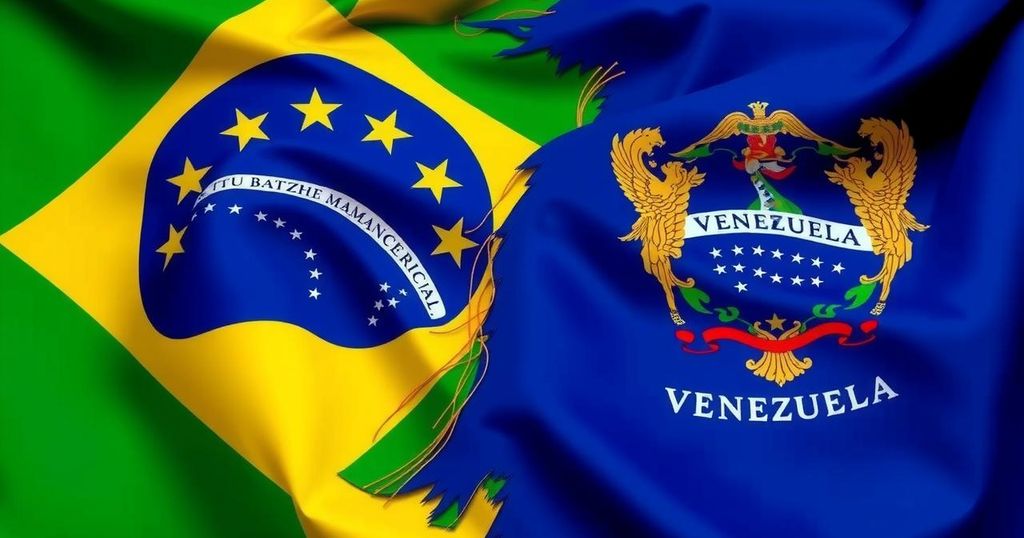Venezuela’s Strong Critique of Brazil’s Veto on BRICS Membership
Venezuela has criticized Brazil for vetoing its BRICS entry, labeling it a “hostile” act linked to ongoing sanctions. The Venezuelan Foreign Ministry claimed this decision reflects a continuation of former President Bolsonaro’s policies and expressed disdain for what it views as exclusion and intolerance. Amidst tensions and differing views on Venezuela’s electoral legitimacy, the BRICS summit resulted in 13 new countries joining, while Venezuela remained excluded, highlighting political complexities in the region.
The Venezuelan government has expressed strong condemnation regarding Brazil’s recent veto of its entry into the BRICS bloc. In a statement released on October 24, following the conclusion of the BRICS summit in Kazan, Russia, the Venezuelan Foreign Ministry characterized Brazil’s decision as “hostile,” alleging that it contributes to the broader framework of international sanctions imposed against Venezuela. This criticism echoes sentiments originally articulated during the presidency of Jair Bolsonaro, reflecting ongoing tensions between the two nations. The Venezuelan Foreign Ministry’s statement highlighted the continuity of Brazil’s stance on Venezuela’s BRICS membership, lamenting that the veto perpetuates “hatred, exclusion, and intolerance” towards Venezuelans. It further described the Brazilian government’s actions as “inexplicable and immoral aggression” that undermines the legacy of Hugo Chávez and the Bolivarian Revolution. Venezuela’s President Nicolás Maduro had formally submitted his country’s application to join BRICS in May 2024, yet reports indicate that Brazil resisted this inclusion during pre-summit negotiations. Ultimately, the BRICS summit resulted in invitations extended to 13 countries to join as partner states, notably excluding Venezuela. Brazil’s Foreign Minister Mauro Vieira stated at the summit that the leading BRICS nations had agreed upon the principles and criteria for future expansion, thus underscoring the need for consensus among member states regarding new entrants. The discord between Brazil and Russia regarding Venezuela’s membership was further emphasized by President Vladimir Putin, who noted Russia’s recognition of Nicolás Maduro’s legitimacy following recent elections, in contrast to Brazil’s refusal to acknowledge the election results. The Venezuelan election held on July 28 resulted in Maduro’s declared victory by the National Electoral Council; however, this result has faced challenges from the opposition, which claims to have obtained a majority of the electoral minutes, although these have not been presented to the Venezuelan judiciary. In light of this, President Lula da Silva has made calls for transparency and has suggested potential new elections, reflecting his administration’s cautious approach to Venezuela’s political situation.
The geopolitical landscape surrounding Venezuela’s entry into the BRICS group has become contentious, particularly in light of differing perceptions of the legitimacy of the Maduro administration. BRICS, composed of emerging economies, is undergoing a phased expansion, with member nations articulating specific criteria for new inclusions. Brazil’s firm rejection of Venezuela’s membership amidst ongoing diplomatic negotiations showcases the complexities of regional political alliances and the impact of domestic electoral disputes on international relations. The tension is compounded by historical grievances stemming from prior administrations, impacting Venezuela’s aspirations for participation in multilateral frameworks.
In conclusion, Brazil’s veto of Venezuela’s entry into BRICS highlights existing political rifts and reflects broader international relations dynamics. The Venezuelan government’s vehement response illustrates the perceived stakes involved in this diplomatic impasse, while the contrasting views held by Russia and Brazil on recognizing Maduro’s legitimacy further complicate the regional political landscape. The future of Venezuela’s aspirations in BRICS appears uncertain as diplomatic negotiations continue to align with domestic electoral controversies.
Original Source: www.brasildefato.com.br




Post Comment